Woman Refuses to Forgive Her Neighbor for Treating Her Dog Terribly All Because She Put Hers Down
Dogs are excellent candidates to be a person's best friend, as they are gregarious pack animals that enjoy praise and affection. Dogs and people share a symbiotic relationship because they have been tamed to the point where they depend on us for survival, and we find that we depend on them almost as much.
Everyone agrees that dogs are man's best companions. Since they discovered that we would feed them if they stayed around long enough, they have become our devoted friends.
A dog's love is always ours to give and receive, as we don't have to love them first. They choose to love us unconditionally, without reservation, and without any conditions.
So, it can be really hard to make the decision to put them down. However, that doesn’t mean you should be cruel to another person's dog just because yours is no longer with you.
This is exactly what we see in today's AITA story. The OP's neighbor had to put their dog down, but suddenly the neighbor's wife developed a hatred for the OP's dog.
The OP mentioned the various things this neighbor did to her dog. After the dog died, they both got new dogs, and the neighbor wanted to be friends with the OP, but she wasn't having any of it.
Read the entire story in the OP's own words as you continue scrolling down.
Here is the story's title

The OP's dog, named Savannah, was a well-behaved dog; she didn’t bark and minded her own business, among other things.
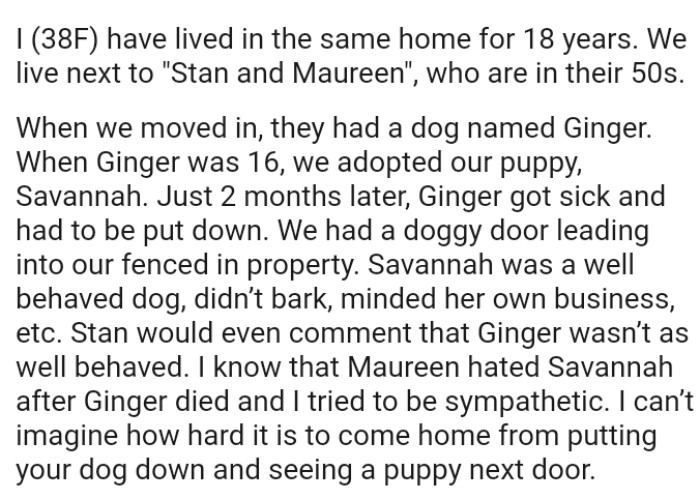
This neighbor would get mad if the OP's dog went outside when she was outside.
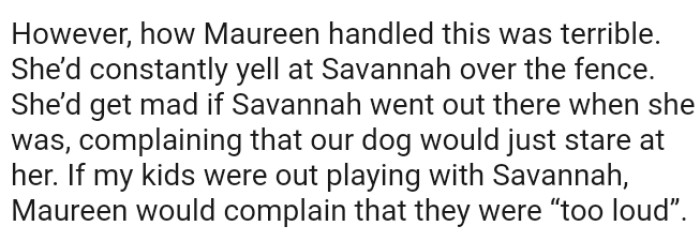
Understanding Grief and Forgiveness
Dr. Patricia Jones, a grief counselor, highlights that unresolved grief can significantly impact our ability to forgive.
Her research indicates that when individuals experience loss, they may struggle to reconcile their feelings toward those involved in the situation.
This struggle can create lasting emotional barriers if not addressed.
Understanding Grief and Forgiveness
Grief can significantly impact interpersonal relationships, particularly when it involves the loss of a beloved pet.
Research in grief psychology indicates that unresolved feelings can lead to ongoing resentment, especially if one party feels betrayed by the actions of another.
In this case, the woman's anger toward her neighbor likely stems from unresolved grief and frustration over her loss.
The neighbor tried saying that she just wanted the OP's dog away from the fence.
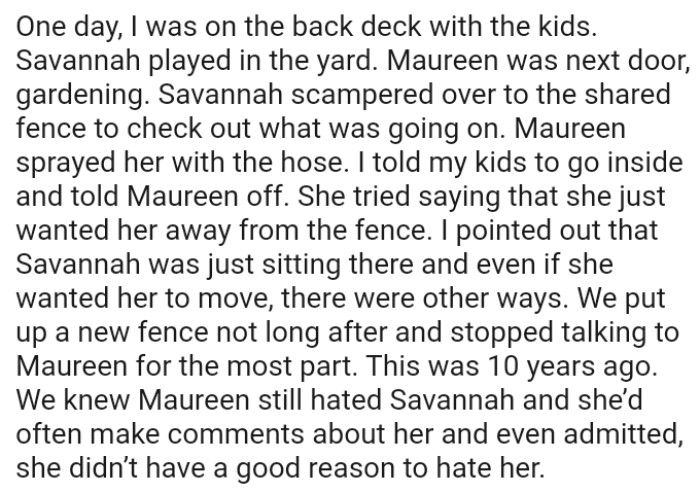
The OP's neighbor pretended like nothing ever happened, which upset the OP.
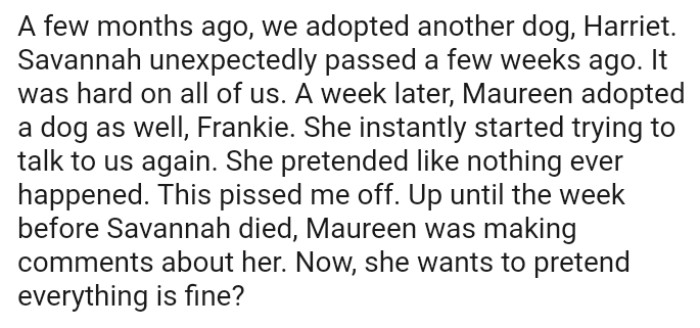
"I'm not going to turn that off just because she’s gone and you want to play nice now."
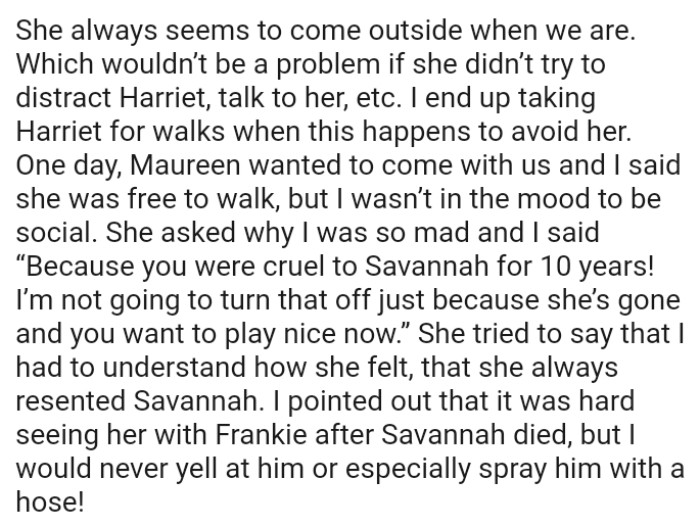
Studies show that forgiveness is a complex psychological process often influenced by personal experiences and emotional wounds.
According to research published in the Journal of Positive Psychology, forgiving others can lead to significant psychological benefits, including reduced anxiety and improved mental health.
Understanding the process of forgiveness can facilitate healing and emotional growth.
Studies show that forgiveness is a complex process that often involves acknowledging the pain and allowing oneself to heal.
When individuals hold onto anger, it can create barriers to emotional well-being and prevent healing from grief.
In this situation, the woman may benefit from reflecting on her feelings about her dog and her neighbor to facilitate healing.
The OP said that she'll be cordial, but she's not going to be friends.

We've gathered some of the most upvoted comments from Redditors for you to read through below.
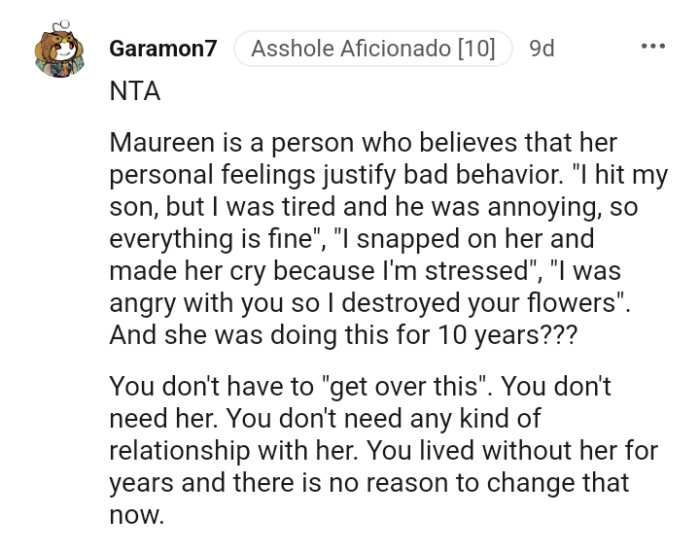
This Redditor is of the firm opinion that the neighbor is no friend of the OP or her dog.

The Role of Empathy in Healing Relationships
Empathy is a crucial component in the process of forgiveness and reconciliation.
Dr. Ellen White, a psychologist specializing in relationships, emphasizes that understanding the other person's perspective can help ease emotional pain.
Her research shows that fostering empathy can lead to healthier relationships and reduce feelings of hostility.
The Role of Empathy in Healing
Empathy can play a crucial role in the healing process, particularly in forgiving others.
Research indicates that understanding the motivations behind another's actions can foster compassion and reduce feelings of resentment.
In this case, exploring the neighbor's perspective may help the woman process her emotions more effectively.
The OP's neighbor clearly needs to act more maturely, as this Redditor won't forgive such an act easily.
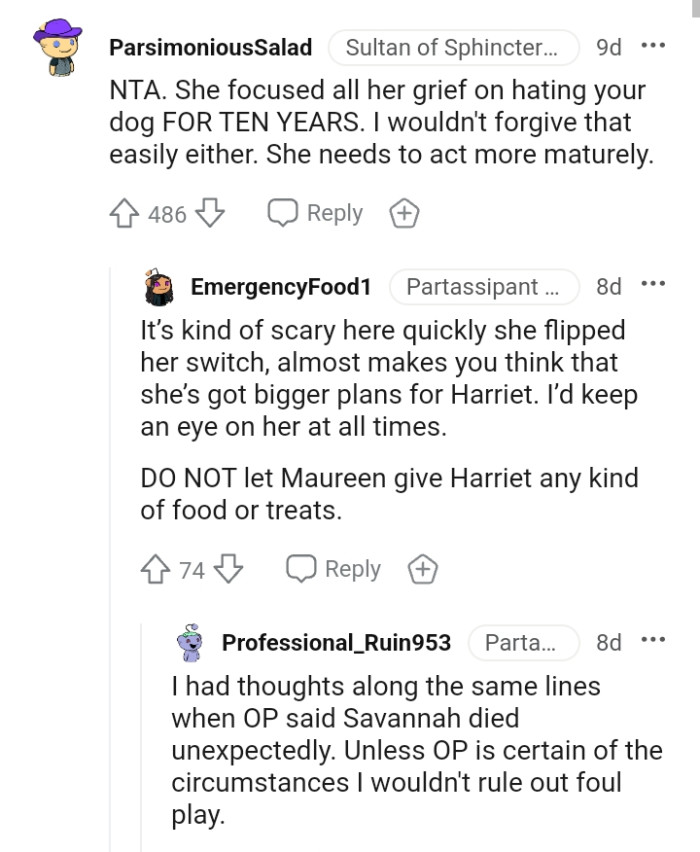
You don't have to spray a dog just because you don't like it.
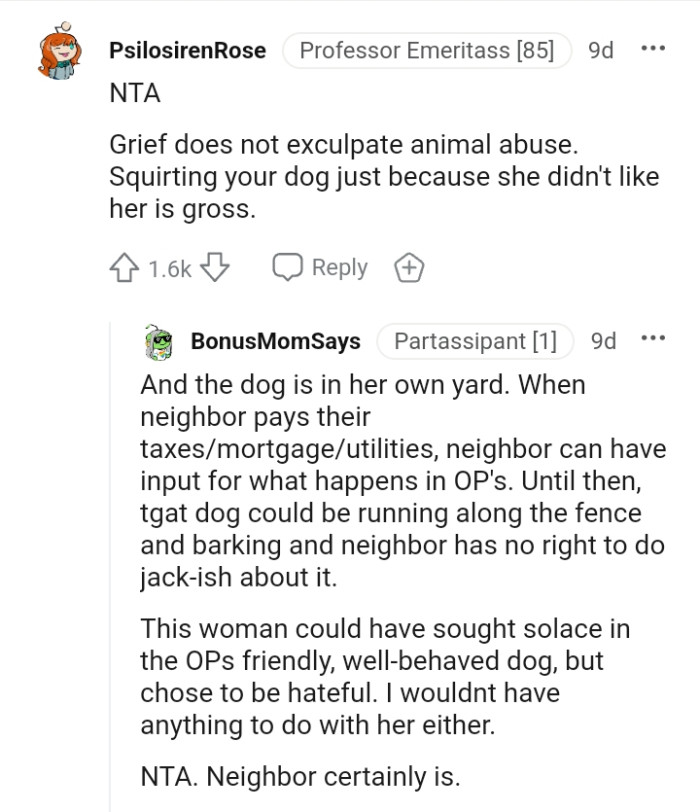
It's easier to let go, but the neighbor clearly couldn't and lashed out.

Psychologists recommend engaging in reflective practices to better understand one's feelings around forgiveness.
Writing about emotions and experiences can facilitate self-discovery and promote healing.
This practice encourages individuals to process their feelings and gain clarity about their emotional responses.
Behavioral psychologists emphasize the importance of addressing unresolved feelings to move forward.
Research shows that individuals who engage in emotional processing are better equipped to let go of resentment and find closure.
In this scenario, the woman could benefit from journaling or discussing her feelings with a trusted friend.
This Redditor would not be putting that behind them either.

Dogs love us despite the fact that we don't deserve it. So why would anyone treat another animal poorly just because their own dog died?
Many Redditors didn't understand that kind of behavior, and I don't either. In the end, the OP was declared not the AH, and if you agree with this verdict, share this post with your family and friends.
Strategies for Moving Forward
Finding closure after a loss often requires intentional strategies.
Studies suggest that creating rituals or memorials can help individuals honor their pets while facilitating the grieving process.
In this case, establishing a personal ritual to remember her dog could provide a sense of peace and allow her to move forward.
Psychological Analysis
This situation illustrates the complexities of grief and the challenges in forgiving others. Engaging in self-reflection and practicing empathy can facilitate healing, allowing for a healthier emotional state moving forward.
Analysis generated by AI
Analysis & Alternative Approaches
Experts in grief psychology emphasize that understanding grief and practicing forgiveness are vital for emotional healing. According to Dr. Ramani Durvasula, clinical psychologist, "Forgiveness is not about letting someone off the hook; it's about freeing yourself from the burden of resentment." Additionally, Dr. Terri Orbuch, relationship researcher and author, states, "Navigating feelings of anger and resentment can lead to healthier relationships and emotional well-being." This highlights the importance of addressing these emotions for personal growth.
Creating Safe Spaces for Communication
Open communication is essential for navigating feelings of resentment and hurt.
Establishing a safe space for discussions can foster understanding and healing.
Psychologists recommend using active listening techniques to ensure both parties feel heard and respected during conversations.
Practicing gratitude and appreciation can enhance the healing process in strained relationships.
By focusing on positive aspects and shared experiences, individuals can build a foundation of trust and connection.
Regularly expressing gratitude can help shift the emotional climate toward one of support and healing.
Psychological Analysis
This situation highlights the emotional turmoil that can arise from unresolved grief and resentment. It's common for individuals to struggle with forgiveness when feelings are still raw. Creating an empathetic environment where open dialogue can occur is essential for healing and moving forward.
Analysis generated by AI
Analysis & Alternative Approaches
Understanding the emotional complexities surrounding grief and forgiveness is crucial for healing relationships.
Research confirms that fostering empathy and open communication can significantly enhance the process of reconciliation.
By prioritizing reflection and gratitude, individuals can navigate these challenges more effectively.



